Papers by Kai Koddenbrock

2 Smart sanctions have been a frequent but supposedly ineffective UN instrument of conflict resol... more 2 Smart sanctions have been a frequent but supposedly ineffective UN instrument of conflict resolution since the end of the Cold War. While most sanctions thinking focuses on sanctions against consolidated states, this paper illustrates how smart sanctions can have an impact in failed states in Sub-Saharan Africa. These failed states are characterised by the lack of a monopoly on violence and plagued by rebellions largely financed through natural resource earnings and foreign support. By analysing the conflicts and respective sanctions regimes and their impact on political support, supply structures and the military balance in Angola and the Democratic Republic of Congo we prove that in particular the advocacy component of smart sanctions regimes – the panel of expert reports and connected diplomatic activities – is able to contribute to their impact. Thanks to this component the ensemble of arms embargos,
Die Disziplin der Internationalen Beziehungen in Deutschland hat wie die Politikwissenschaft in i... more Die Disziplin der Internationalen Beziehungen in Deutschland hat wie die Politikwissenschaft in ihrer Breite eine Fokussierung auf Theorien und Analysen mittlerer Reichweite durchgemacht. Dieser Konsens folgte auf Jahrzehnte der Selbstvergewisserung in der Nachkriegszeit und der hochpolitisierten 1970er Jahre. Angesichts der offensichtlich konfliktiven Weltmachtkonkurrenz und globaler Abhängigkeitsverhältnisse gewinnen makrotheoretische Perspektiven an Relevanz, die polit-ökonomisch das Zusammenspiel innergesellschaftlicher und weltgesellschaftlicher Prozesse zu fassen versuchen. Anhand zweier Vignetten zur deutschen Außen- und Außenwirtschaftspolitik und zur Geschichte der Beziehungen zwischen Europa und Senegal illustriert der Aufsatz, wie eine solche polit-ökonomische Analyse für die IB fruchtbar gemacht werden kann.
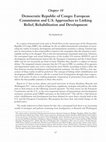
In a region of protracted crisis such as North Kivu in the eastern part of the Democratic Republi... more In a region of protracted crisis such as North Kivu in the eastern part of the Democratic Republic of Congo (DRC), the challenge for the socalled international community of reconciling the realms of security, development and humanitarian assistance is daring. External support or intervention in this crisis/conflict is based on the assumption that this situation is unacceptable and has to be changed. This is why the international community intervenes. However, the conceptual logic and actual fieldpractice of the sizable UN mission MONUC and of development and humanitarian donors like the European Commission and the United States differ and do not necessarily go hand in hand. Whether they should is a subject of intense debate. The integrated mission structure that the UN uses in DRC to combine all its agencies and departments under one roof is criticized by some NGOs. According to them it blurs the lines between security, development and humanitarian assistance. For these NGOs, a clea...
The war in Syria and the plight of refugees from the Middle East and North Africa have placed a f... more The war in Syria and the plight of refugees from the Middle East and North Africa have placed a focus on humanitarian aid unseen since the 2003 Tsunami...

Smart sanctions have been a frequent but supposedly ineffective UN instrument of conflict resolut... more Smart sanctions have been a frequent but supposedly ineffective UN instrument of conflict resolution since the end of the Cold War. While most sanctions thinking focuses on sanctions against consolidated states with unwanted governments, this book illustrates how smart sanctions can be used to prop up governments in failed states in Sub-Saharan Africa. These failed states are characterised by the lack of a monopoly on violence and plagued by rebellions which are largely financed through natural resource sales and foreign support. The author analyses the sanctions regimes in Angola and the Democratic Republic of Congo to gauge their impact on political support, supply structures and the military balance of the deadly conflicts there. He argues that in particular the advocacy component of smart sanctions regimes – the panel of expert reports and connected diplomatic activities – is able to contribute to their success. Thanks to this component the ensemble of arms embargos, financial, ...
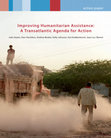
2 "Humanitarian space" is a concept to denote the neutrality and independence of humanitarian act... more 2 "Humanitarian space" is a concept to denote the neutrality and independence of humanitarian actors from military and political forces that allows them to provide lifesaving aid to those in need on both sides of a conflict. 3 ResourceNexus will be accessible at www.resourcenexus.org in late 2009. 4 Based on the New Transatlantic Agenda and the Joint Action Plan agreed between the EU and the U.S. in 1995, a High-Level Consultation Group on humanitarian and development issues was formed. After a few years of operation, however, regular meetings were abandoned. o 5 Also based on the 1995 New Transatlantic Agenda, an EU-U.S. Senior Level Group was created to address key foreign policy issues. 6 Several times per year, DG ECHO and USAID engage in a strategic dialogue, either through in-person meetings or telephone conferences. This is currently the main and highest ranking bilateral forum for addressing questions relating to humanitarian policy. While the meeting has recently been expanded to include for example the U.S. Department of State, it does not include all institutions relevant to the questions sketched above. If the EU and the U.S. opt for using the strategic dialogue as the forum for addressing controversial normative and policy questions, the dialogue would therefore have to be further expanded. dedicate meetings of the EU-U.S. Senior Level Group on humanitarian issues; 5 expand the strategic dialogue between DG ECHO and USAID to include the most relevant institutions for emergency relief and preparedness, including among others the U.S. Departments of State, Defense, and Agriculture and the European Commission Directorates-General for Development and Foreign Relations or the Council. 6 €1.4 billion $2.1 billion 18 Bill Emerson Humanitarian Trust-an emergency grain and cash reserve Department of
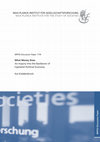
The theory and critique of capitalism is back at the center of scholarly debate. With it comes a ... more The theory and critique of capitalism is back at the center of scholarly debate. With it comes a growing awareness of the analytical and political importance of money and money creation. Moving from the more systemic reflections of Karl Marx to more recent work on money theory by Geoffrey Ingham and in financial economics, the paper focuses on three of money's "deeds." As a social structure and process, it makes moneymaking through capital permeate all our societies. As a public-private partnership between the state, rentiers, banks, and taxpayers that has existed since the foundation of the Bank of England in 1694, it binds these actors together in shifting relations of dependence. In today's financial capitalism, what counts as money and how far moneyness stretches into the realms of financial innovation has been the core object of struggle in the public-private partnership of money. In conclusion, the paper discusses how contemporary money redistributes intra-so...

Kritische Normenforschung in den Internationalen Beziehungen
Internationale Versuche, den kongolesischen Staat zu stärken, benötigen ein klares Verständnis vo... more Internationale Versuche, den kongolesischen Staat zu stärken, benötigen ein klares Verständnis von zweierlei: dem Staat und der Demokratischen Republik Kongo. 1 Statebuilding muss wissen, was genau es bauen will. Dieses doppelte Erfordernis wird jedoch auf überraschende Weise eingelöst. So bezweifeln manche Analysen die Existenz des Kongos rundheraus: »Sie nennen es ein Land, tatsächlich ist es nur ein Zaire-förmiges Loch in der Mitte Afrikas« (Economist 1998) oder »Die Demokratische Republik Kongo existiert nicht« (Herbst/Mills 2009) sind zwei prominente Beispiele für diese Praxis. Rhetorische Aufhänger orientieren sich an den Erwartungen des Publikums. Für dieses Publikum scheint es fraglich zu sein, ob der Kongo überhaupt existiert. Der souveräne Staat und das anarchisch oder hierarchisch strukturierte Staatensystem hingegen sind lange das konzeptionelle Kernstück der Internationalen Beziehungen (IB) gewesen. Souveränität und Staat wurden nicht nur selbstverständlich vorausgesetzt, sondern fungierten auch als zentrale Normen internationaler politischer Praxis. Politische Kollektive mussten Staaten werden, um auf der internationalen Bühne ernst genommen zu werden. Diese Sollens-Funktion des Staates zeigt seinen Norm-Charakter. Zugleich stellt der Staat schon immer eine der schwierigsten Herausforderungen für die politische Soziologie dar. Was in der internationalen politischen Praxis selbstverständlich ist, ist höchst umstritten in der akademischen Reflexion. Wenn der Kongo nicht als inexistent angesehen wird, wird er zumeist als schwacher oder gescheiterter Staat gefasst. Die IB braucht den Staat, 1.

Environment and Planning A: Economy and Space
Finance plays a major role in discussions about state capitalism in emerging markets, but the foc... more Finance plays a major role in discussions about state capitalism in emerging markets, but the focus has so far been on banks. Capital markets have been neglected. Moreover, findings from the growing literature on financialization in emerging markets indicate that in some cases there is increasing state involvement in the development and functioning of capital markets. Hence, the relationship between the state and finance in these economies may be fundamentally different from the picture provided by liberal Western-centric perspectives. Instead of looking at capital markets as uniform entities, we propose to analyse them as variegated – while characterized by common financialization processes, they can be informed by different institutional logics, leading to very different market dynamics and outcomes. We explore to what extent these differences exist and how state-capitalist economies facilitate capital market development. Our comparative institutional analysis of securities exchan...

Community Development Journal
The financialization debate has not paid enough attention to the African continent. The continent... more The financialization debate has not paid enough attention to the African continent. The continent’s populations and governments have found creative ways of dealing with the capitalist world market and political power relations since decolonization in the late 1950s. However, several forms of structural dependence and subordination persist. We ask in this article how the global process of financialization has unfolded across the continent and what it means for relations of dependence. We understand financialization as the global expansion of financial practices, and, in particular, the financial sector, that followed the end of the Bretton Woods era. We consider to what extent it has occurred at all in the four case study countries of Mauritius, Nigeria, Zambia, and South Africa. The empirical analysis of aggregate country data shows that financialization is, at best, an uneven and patchy process on the continent, not a general structural shift in the way capital accumulation is orga...
Journal of Cultural Economy
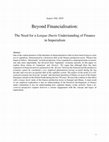
One of the central premises of the literature on financialisation is that we have been living in ... more One of the central premises of the literature on financialisation is that we have been living in a new era of capitalism, characterised by a historical shift in the finance-production nexus. Finance has begun to behave 'abnormally' towards production. It has expanded to a disproportionate economic size and, more importantly, has divorced from 'legitimate' economic pursuits. In this paper we explore these claims of 'expansion' and 'divorce'. We argue that although there has been expansion of financial motives and practices the 'divorce' between the financial and the productive economy cannot be considered a new empirical phenomenon having occurred during the last decades and even less an epochal shift of the capitalist system. The neglect of the needs of a self-centered economy has been the 'normal' and structural operation of finance in most of the former European colonies in the Global South during the last 150 years. We provide evidence to that effect with a longue durée study of the finance-production nexus in Senegal and Ghana. A main result of our empirical exploration is that an understanding of the historical developments of finance under colonialism is key for understanding how capitalist finance works globally. Such a de-centered perspective requires however a serious engagement with the concept and logics of imperialism. 2
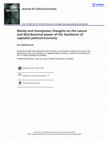
This paper contends that political economy may profit from an understanding of money that is both... more This paper contends that political economy may profit from an understanding of money that is both able to account for its systemic importance as well as money's specific role for the contemporary distribution of wealth. 'Money-ness' is a strategic factor in profit-making and capital accumulation. If we accord moneyness to all those instruments that make the repackaging of credit and other financial assets and liabilities and their capitalization possible, we arrive at an understanding of money that underscores the Marxian analysis of the structural importance of the money relation for capital accumulation that is up to speed with current financial innovations. As a social structure and process, moneymaking through capital permeates society. As a public-private deal between the state, rentiers, banks, and taxpayers that has existed since the foundation of the Bank of England in 1694, it binds these actors together in shifting relations of dependence. Under financial capitalism today, what counts as money and how far moneyness stretches into the realms of financial innovation has been a core object of struggle in the public-private deal of money creation.
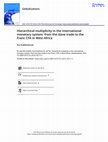
This article investigates the relationship between international currency hierarchies and 'societ... more This article investigates the relationship between international currency hierarchies and 'societal multiplicity'. I provide an historical sketch of how West African societies and the rest of the world have engaged in trading money for slaves and raw commodities for centuries. I concur that societal multiplicity can indeed be seen as lying at the root of the global monetary system with its multiple currencies. However, my analysis offers three criticisms: First, the multiplicity project fails to give adequate attention to hierarchies in general and to those that come with monetary relations in particular. Second, Because of the existence of the world market, there is always a global and hierarchical sphere that is non-identical to societies and transcends their interaction. Third, money as both global and multiple relation points at the need for a more dynamic understanding of 'society' as political and economic borders do not necessarily map unto each other.











Uploads
Papers by Kai Koddenbrock
They do not pretend to neatly verify their arguments in the same way that scholars are forced to do in high impact journals. The reader will not find boring literature reviews, long bibliographies and overly artificial politeness. A dialogue, we assume, is a direct and polemical fight with the dialogue partner as well as with the problem discussed. In fact, we believe that only in arguing with each other will the problem(s) eventually take shape and become visible. Taken as a whole, however, the contributions exemplify that a multi-perspectival approach to the question leads to – how should it not? – a multiplicity of entry points into the discussion.
The dialogue is split into two sections, which are separated by an intermezzo. The two sections, ‘Thought and Critique: Fun vs. Responsibility’ and ‘Society and Critique: Overcoming Anti-Foundationalism’, consist of three short pieces each that revolve around similar issues and cross-reference each other. In the middle, an ‘Intermezzo’ offers a very timely sketch of the ideology of finance with immediate relevance to the current euro-zone crisis and Greece’s position in it. It is placed in between the more theoretical parts as a reminder of the critical potential of empirically sensitive but theoretically inspired research.
Introduction
1. Ruling the Congo: Colonial Legacies and Strategies of Rule Today
2. A Congo Ripe for Intervention: The Pitfalls of Knowledge Production
3. Managing the two faces of intervention: NGOs and the UN between Public Proclamations and Operations
4. The Insecurity of Legitimate and Effective Presence: The Individual in Intervention
Conclusion
Abstract
This book examines the practices in Western and local spheres of humanitarian intervention, and shows how the divide between these spheres helps to perpetuate Western involvement.
Using the Democratic Republic of the Congo as a case study – an object of Western intervention since colonial times – this book scrutinizes the contemporary practice of humanitarian intervention from the inside. It seeks to expose how humanitarian aid and peacekeeping works, what obstacles they encounter and how they manage to retain their legitimacy. By examining the relationship between the West and the DR Congo, this volume asks why intervention continues to be so central for the relationship between Western and local spheres. Why is it normal and self-evident? The main answer developed here is that the separation of these two spheres allows intervention to enjoy sufficient degrees of legitimacy to be sustained. Owing to the contradictions that surface when juxtaposing the Western and Congolese spheres, this book highlights how keeping them separate is key to sustaining intervention. Bridging the divide between the liberal peace debate in International Relations and anthropologies of humanitarianism, this volume thus presents an important contribution to taking both the legitimizing proclamations and ‘local’ realities of intervention seriously.
The book will be of much interest to students of statebuilding, peacebuilding, peacekeeping, anthropology, research methods and IR in general.
Endorsements
'From the heart of darkness under the colonial rule to the heart of goodness epitomized by humanitarian interventions, Kai Koddenbrock traces the fate of Congo in its tragic encounters with the various avatars of the Western world's engagement on the African continent. Focusing on the actual practices of peacekeepers and aid workers, this short and dense book is an important contribution to the understanding from below of contemporary international relations.' -- Didier Fassin, Institute for Advanced Study, USA
‘This meticulous study of international engagement in the Congo draws out the two worlds of humanitarian intervention: the self-referential and self-legitimising world of Western actors, engaged in projects of assistance and protection, and the other, less studied, world of Congolese social and political interaction. These two worlds coexist and interact in a multitude of ways which challenge Western self-understandings and help to clarify the contradictions and limits of international practices on the ground. Conceptually informed and empirically rich, this book is a major contribution to the field.’ -- David Chandler, University of Westminster, UK
‘The Practice of Humanitarian Intervention is a fine supplement to the emerging literature that looks beyond and beneath policy statements and headquarter levels and aim for grounded ethnographic approach to external interventions. Through a detailed case study of DR Congo, Dr. Koddenbruck adds to our understanding of the multitude of external interventions in this country, but also contributes strongly to opening up a new and promising terrain for theorising and conceptual elaborations in-between IR and ethnographic-inspired work.’ -- Morten Boas, Norwegian Institute of International Affairs, Norway
‘This book is a showcase how empirical depth and up-to-date theoretical reflection can reveal the ambiguity – if not at times the absurdity – of those instances of internationalized rule that we call ‘interventions’. In a world in which more and more layers of authority overlap, these might well be insights into our common future.’ -- Klaus Schlichte, University of Bremen, Germany
‘The Practice of Humanitarian Intervention is an original analysis full of fascinating insights and grappling stories about international aid in Congo. It is an excellent resource for all those interested in better understanding the peculiar world that interventional interveners inhabit.’ -- Séverine Autesserre, Columbia University, USA.
‘Social transformation takes deep social penetration. As Koddenbrock demonstrates in minute detail, half a century of Western intervention amounts to little more than a road trip. Predictably, superficial engagement spells superficial transformation.’ -- Iver Neumann, LSE, UK.
interaction and the role of history. After highlighting the fact that both of these performances can usefully be made to undercut the seeming inescapability of the state norm in International
Relations, I argue that doing IR ethnographically is in itself a performative practice. The third performance of the Congo offered here is thus the one made by the analyst himself - an
ambiguous performance which strives to bring the state back out to render continued intervention in the Congo harder to justify.